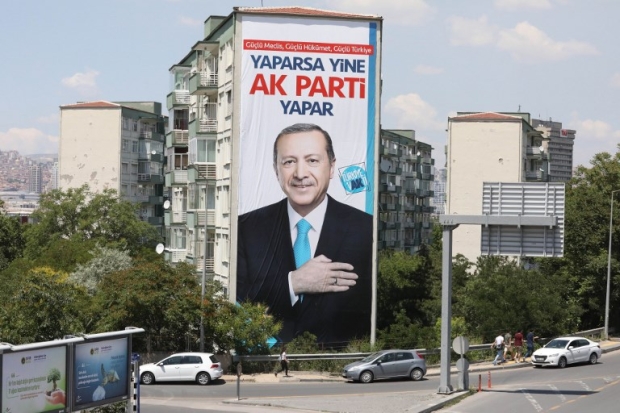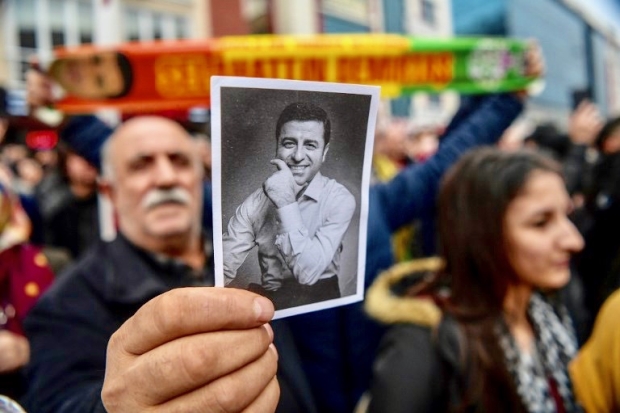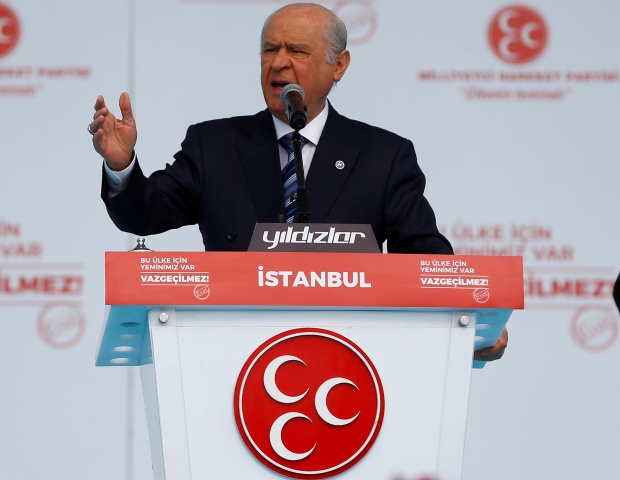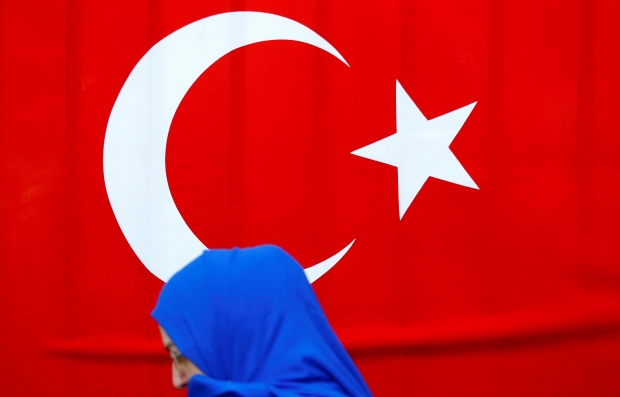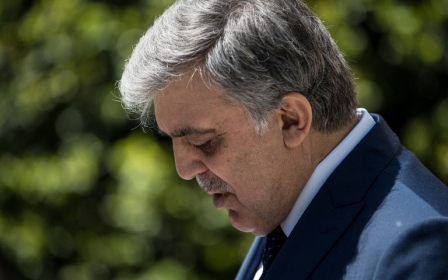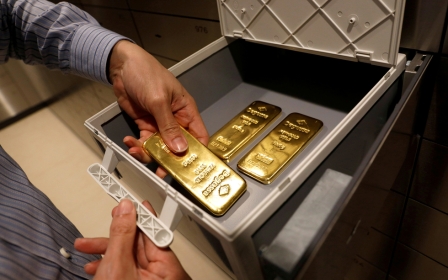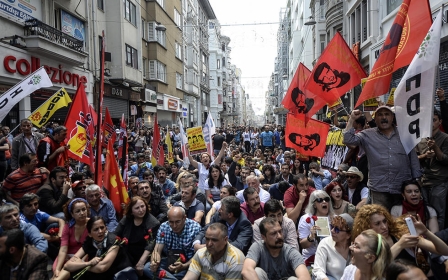It is impossible to guess what Turkey will wake up to on 25 June
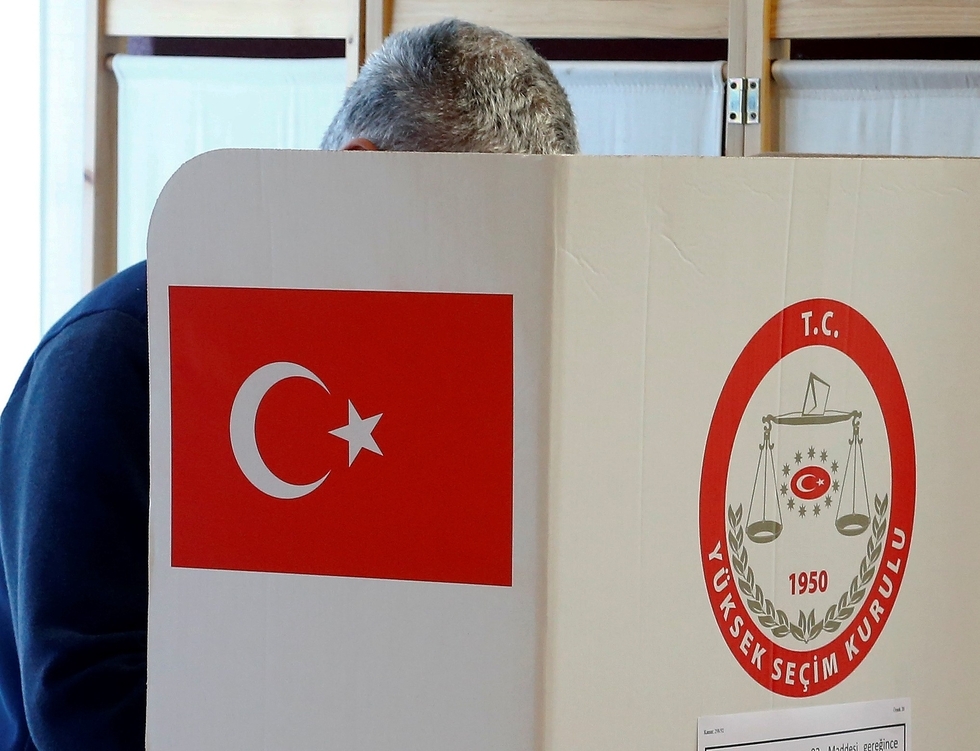
On 18 April, Turkey's President Recep Tayyip Erdogan called for snap parliamentary and presidential elections to be held on 24 June, over a year earlier than planned. The president said he made the decision after meeting with Nationalist Movement Party (MHP) leader Devlet Bahceli, with whom he made a formal electoral pact.
Both Erdogan and Bahceli cited a need "to overcome uncertainty" as the main reason behind their joint decision to bring forward the polls from their scheduled November 2019 date.
Why snap elections
With the upcoming election, Turkey will switch from a parliamentary system to a presidential one that will increase the powers of the president significantly. The system was changed in an April 2017 referendum that was narrowly won by the government's "yes" camp.
Erdogan and his ultranationalist ally say the executive presidency will bring "stability" to the country amid increasing security threats and deteriorating relations with the West.
But leaving the alleged need to "overcome uncertainty" aside, there seem to be three main factors behind Erdogan and Bahceli's decision to pull the election date forward: growing vulnerabilities in the economy, upcoming local elections and a joint desire to prevent Turkey's fractured opposition from uniting behind a strong presidential candidate.
Recent surveys have shown that Turkish voters are increasingly concerned about the country's economic prospects
Recent surveys have shown that Turkish voters are increasingly concerned about the country's economic prospects. The devaluation of the Turkish lira seems to be unstoppable, inflation is high, and according to some analysts there is a financial and economic crisis looming on the horizon.
Erdogan, who has been in power since 2002 either as prime minister or president, knows that any major economic hiccup before the election would be blamed on his leadership and cost him votes. By bringing the polls forward, he is trying to limit the negative effect that the worsening economy would undoubtedly have on his popularity.
The upcoming local elections are another reason the president and his allies wanted to bring the date for presidential and parliamentary elections forward.
The agreement enables Bahceli's MHP to enter parliament even if it receives less than the necessary 10 percent of the vote that a party must secure. (Under a new law passed earlier this year, a party that enters the election in an alliance with another that crosses the threshold is exempted from that rule).
In return, Bahceli agreed to support Erdogan in the presidential contest, increasing the AKP leader's chances of being elected outright with an absolute majority of the vote in the first round of the two-tier election.
Yet the two parties did not even entertain the idea of forming a similar pact for local elections, scheduled for March 2019.
MHP-AKP electoral pact
Erdogan and Bahceli have been reluctant to participate in local elections under a joint ticket because they both know grassroots MHP supporters do not view the current president (and the ruling AKP) as favourably as do the higher cadres of their party. On 15 March, MHP's Cengiz Ergun, who is the mayor of Manisa, voiced this sentiment when he said: "There may be a leadership alliance, but there is no grassroots alliance."
As a result, Erdogan and Bahceli are not only reluctant to form an alliance, but they also do not want these polls to take place before the ever-important parliamentary and presidential ones. They believe, with good reason, that the animosity likely to arise between supporters of both parties during local elections may cause cracks in the MHP-AKP electoral pact later on.
Neither economy, nor the upcoming local elections is the main reason why Erdogan and Bahceli are eager to go to the polls as soon as possible
Also, Erdogan is nervous about his party's performance in Turkey's big cities. In last year's constitutional referendum, the president and his party lost the vote in Istanbul, Ankara and Izmir. Erdogan has since carried out a purge within its party, firing AKP mayors and local cadres.
Yet, he still does not seem to be confident that his party will not face further losses in next year's local elections, and he does not want such a disappointment to hurt the morale of the AKP cadres before the presidential vote.
And they largely succeeded in doing so.
A fractured opposition
After spending weeks trying to agree on a presidential candidate they could all support, Turkey’s opposition parties eventually decided to join forces in the parliamentary election, but not the presidential one.
Turkey's main opposition Republican People's Party (CHP) nominated Muharrem Ince, one of its most combative and outspoken lawmakers, for president. CHP leader Kemal Kilicdaroglu said he chose not to run for president because he "does not believe the head of a party should simultaneously serve as head of state".
Meanwhile, the pro-Kurdish Peoples' Democratic Party (HDP) nominated its imprisoned former co-chair, Selahattin Demirtas, as its presidential candidate.
According to Turkey's new presidential election system, a candidate can either be nominated by a political party that has received more than 5 percent of the votes in the previous elections or a political party that has a group in parliament.
Any other candidate would have to collect signatures from at least 100,000 citizens to run for president. Two independent candidates, Iyi (Good) Party’s Meral Aksener and Felicity Party (SP) leader Temel Karamollaoglu have managed to collect the required number of signatures and secured places for themselves on the ballot.
But none of these candidates seems to have a fighting chance against Erdogan - at least in the first round of the poll.
The 'Turkish Marine Le Pen'
Meral Aksener, dubbed "the Turkish Marine Le Pen" by the foreign press, undoubtedly rattled both Erdogan and Bahceli last October by establishing a new "centre-right" party with a promise to "shake up" Turkey's political sphere.
But Aksener is an MHP veteran. Her politics do not differ much from the ultranationalist party she called home for decades, other than her opposition to Erdogan. She is a staunch denier of the Armenian genocide, she is vehemently against any dialogue with Turkey's Kurds and she once referred to PKK leader Abdullah Ocalan as "Armenian offspring".
In recent years, she reinvented herself as a fresh voice for the opposition and started to promote a more "moderate" political outlook. In 2016, she was expelled from the MHP, along with some other senior members, after an unsuccessful bid to remove its leader Bahceli.
A couple of weeks ago, while the opposition's search for an umbrella candidate was still ongoing, an old acquaintance of mine tweeted: "I think I’m going to have to vote for Erdogan after all."
Knowing that he had been highly critical of the president for at least a decade, I couldn’t help but ask what made him change his mind. His response was quite telling: "If it is a choice between Erdogan and Aksener, or someone like her, I'd rather vote for Erdogan."
A candidate behind bars
On the other end of the political spectrum, the pro-Kurdish left-wing HDP chose to nominate its jailed former leader Selahattin Demirtas for president. Demirtas is a prominent political force in Turkey, who helped extend the HDP’s support base beyond the Kurdish population. Under his leadership, the party managed to pass the 10 percent electoral threshold in the June 2015 parliamentary elections.
The HDP’s success caused the AKP to lose its majority in parliament. The AKP's unsuccessful attempts to form a coalition government resulted in a snap general election being called for November 2015.
Since then, Erdogan's party stopped its efforts to find a sustainable solution to Turkey's decades-long Kurdish conflict and instead started to vilify Demirtas and his political allies as "terrorists" who support the outlawed Kurdistan Workers' Party (PKK). Demirtas was consequently jailed in November 2016 on charges of "terror" and having links to the PKK.
Today, Demirtas remains a polarising figure in Turkey. While he is a voice for democracy and peace in the eyes of Turkey's Kurds and liberals, most nationalists perceive him as a PKK sympathiser who could never be the leader of the "Turkish" nation.
Demirtas ran as the HDP's presidential candidate against Erdogan in the 2014 presidential election and came in third place with 9.77 percent of the vote. Today, at a time when the nationalist sentiment in Turkey is stronger than ever following the Afrin military operation in Syria, it is even more unlikely that he is going to garner a high enough percentage of the vote to pose a serious threat to Erdogan's candidacy.
An Islamist set to steal votes from Erdogan
The Felicity Party leader Temel Karamollaoglu is another candidate who managed to secure a nomination as an independent by collecting 100,000 signatures from the public, like Aksener. Karamollaoglu is a prominent name in the "National View," the movement that pioneered political Islam in Turkey.
Karamollaoglu himself is not seen as a serious contender against Erdogan in the upcoming presidential poll, but analysts believe he can still prove to be a critical player; he may help tip the scale in the opposition's favour in the first round of the election by attracting pious Turks and Kurds disillusioned with Erdogan's rule.
Can Ince win?
All in all, none of the aforementioned candidates have the widespread support necessary for outright defeat of Erdogan in the first round of the presidential poll.
Even the CHP candidate Ince, who by far has the broadest appeal as the mainstream opposition's moderate candidate, will not be able to secure 50 percent of the vote against a strong candidate like Erdogan, especially in a highly fractured and polarised political landscape such as this one.
But if Erdogan fails to declare victory in the first round, Ince could be well placed to take on the incumbent president in a one-on-one race.
Since his nomination was made official on 4 May, Ince has been actively working towards securing other opposition groups' support for such a scenario. For example, on 5 May, the CHP candidate called for the release of Demirtas, challenging Erdogan to "let us race like men" in the snap elections.
"The HDP supporters are children of this nation, the AKP supporters are also children of this country ... Don't keep Demirtas in jail. Come, let's race like men," Ince told his supporters in his hometown of Yalova, where he held his first rally.
Ince also called on CHP members to sign for other candidates seeking 100,000 signatures in order to run for the presidency, including Aksener and Karamollaoglu.
But despite all his efforts, the odds are still against the CHP candidate. Turkey will go into the elections under a state of emergency, which has been in place for nearly two years. Turkish media are largely controlled by Erdogan and his supporters, and opposition candidates rarely get enough screen time to put their election manifestos forward.
Also, MHP's support for Erdogan's candidacy and the opposition's failure to unite behind Ince makes it highly unlikely that the CHP candidate will even get a chance to face the incumbent president in a one-on-one race that he might actually have a chance to win.
Overall, it looks like Erdogan will get his way and become Turkey's first executive president on 24 June. The opposition also seems to be aware of this reality, and this is why all opposition groups have recently been focusing most of their efforts on the equally crucial parliamentary elections.
What will happen in the parliamentary elections?
Despite their failure to agree on an umbrella presidential candidate, on 5 May, Iyi Party, CHP, SP and the minor centre-right Democratic Party announced a political alliance in a bid to weaken the AKP's 16-year dominance of parliament.
The pact will undoubtedly increase the number of opposing voices in the parliament and dilute the AKP's control of the legislature. The parties in the alliance already said once in parliament they will focus on ending the state of emergency and pushing for a return to the parliamentary system.
Yet it is important to note that the alliance does not include the HDP, Turkey's third-largest opposition party. It is believed that Kilicdaroglu, Aksener and Karamollaoglu chose to exclude the pro-Kurdish party from the alliance to avoid being accused of collaborating with "PKK supporters".
Also, the core bases of both CHP and the Iyi Party are staunch nationalists who could abandon ship if their parties were perceived to be softening on the Kurdish problem. The decision to exclude the HDP from the pact already alienated some left-wing voters by causing them to perceive the alliance as a "right-wing" coalition.
The HDP announced that it will enter the parliamentary race on its own, and it will probably manage to pass the 10 percent threshold - thanks to Turkey's considerable Kurdish population and the left-wing seculars, liberals and everyone else who is angry with the government but also reluctant to support the main opposition bloc's increasingly nationalistic outlook.
It is impossible to guess what Turkey will wake up to on the morning of 25 June. For now, it looks like Erdogan and Bahceli's snap election gamble has paid off: all the indications are for yet another Erdogan victory. Nevertheless, the upcoming snap election also (albeit partially) brought Turkey's fractured opposition together.
And, no matter the election result, this new-found unity may yet cause the president problems in the long run.
- Birce Bora is a London-based Turkish journalist and researcher. She holds a PhD in Journalism from City, University of London. Her thesis examined the representation of Turkey in the British print media 2007-13.
The views expressed in this article belong to the author and do not necessarily reflect the editorial policy of Middle East Eye.
Photo: Turkish voters cast their ballots on the constitutional referendum at the Turkish consulate in Zurich, Switzerland on 28 March 2017 (Reuters)
New MEE newsletter: Jerusalem Dispatch
Sign up to get the latest insights and analysis on Israel-Palestine, alongside Turkey Unpacked and other MEE newsletters
Middle East Eye delivers independent and unrivalled coverage and analysis of the Middle East, North Africa and beyond. To learn more about republishing this content and the associated fees, please fill out this form. More about MEE can be found here.



